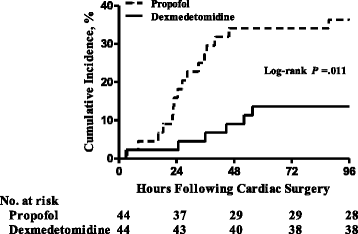Dexmedetomidine sedation reduces atrial fibrillation after cardiac surgery compared to propofol: a randomized controlled trial
- PMID: 27654700
- PMCID: PMC5031329
- DOI: 10.1186/s13054-016-1480-5
Dexmedetomidine sedation reduces atrial fibrillation after cardiac surgery compared to propofol: a randomized controlled trial
Abstract
Background: Atrial fibrillation occurs frequently in patients following cardiac surgery and can be a cause of increased morbidity and mortality. The use of dexmedetomidine to prevent atrial fibrillation is unclear. The present study was designed to evaluate the effect of dexmedetomidine sedation on the incidence of atrial fibrillation after cardiac surgery.
Methods: Upon arrival to the intensive care unit (ICU), cardiac surgery patients without prior atrial fibrillation or flutter were randomized to receive either dexmedetomidine (0.2-1.5 μg/kg/h) or propofol (0.3-3 mg/kg/h) open-label titrated to a target Richmond agitation-sedation scale of 0 to -3. Our primary endpoint was the incidence of postoperative atrial fibrillation, and the secondary end points were the length of ICU stay, length of hospital stay, and hospital costs.
Results: Atrial fibrillation occurred in 6 of 44 patients (13.6 %) in the dexmedetomidine group compared to 16 of 44 patients (36.4 %) in the propofol group (odds ratio = 0.28; 95 % confidence interval, 0.10, 0.80; P = 0.025). The median (interquartile range) length of ICU stay in the dexmedetomidine group was significantly lower than in the propofol group (2.9 (2.4-3.5) vs 3.5 (2.7-4.5 days, P = 0.008), with a trend toward a decrease in median hospital costs (86,367 vs 77,874 Chinese yuan; P = 0.068). The incidence of hypotension was higher in the dexmedetomidine group than in the propofol group (25/44 (56.8 %) vs 13/44 (29.5 %); P = 0.017).
Conclusions: Dexmedetomidine sedation reduced the incidence of new-onset postoperative atrial fibrillation and shortened the length of ICU stay in patients after cardiac surgery compared to propofol sedation. Dexmedetomidine treatment was associated with more episodes of hypotension.
Trial registration: chictr.org.cn: ChiCTR-IPR-16008231 , retrospectively registered: April 6, 2016. This trial was not prospectively registered due to a lack of importance applied to trial registration.
Keywords: Atrial fibrillation; Cardiac surgery; Dexmedetomidine; Propofol; Sedation.
Figures
References
LinkOut - more resources
Full Text Sources
Other Literature Sources
Medical
Miscellaneous



